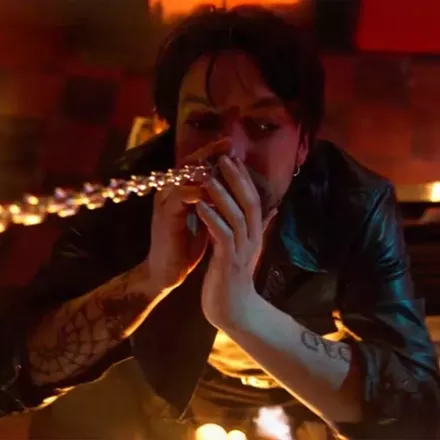Bored of the Flies
Monos too rarely moves beyond a familiar story of violent youth.
By David Riedel @daveseesmoviesIn an unnamed Latin American country, 18 teen soldiers (the "Monos" of the title, which translates to "monkeys"), members of a rebel group known as The Organization, keep watch over American hostage Doctora Sara Watson (Julianne Nicholson, looking appropriately disheveled except for her eye makeup). In their down time, the kids—called Bigfoot, Wolf, Rambo, Dog, Smurf, Swede, Boom Boom and Lady—play soccer blindfolded, pair off in so-called partnerships and whack Rambo with a whip 15 times in a birthday celebration. (They make an aghast Doctora take part, using her revulsion as fuel to egg her on.)
Everything is going as well as it can on the freezing mountaintop they call home. When The Messenger (Wilson Salazar), the kids' contact with The Organization, delivers a milk cow named Shakira and dictates that the kids protect Shakira and milk her at the appropriate times, things change. These are child soldiers with big guns, after all, and in a moment of sheer youthful stupidity, Dog (Paul Cubides) indiscriminately fires his weapon into the distance and kills the cow.
Despondent and fearful of reprisal from The Messenger, the Monos' group leader commits harikari. The Messenger makes Bigfoot (Moises Arias, a million miles from his role on Hannah Montana) group leader, and he begins running things with wanton ruthlessness.
It's not like the Monos' lives were all sunshine and peanut butter with their previous leader, but Bigfoot has precisely zero compassion. After a battle with the government forces the Monos into the jungle, Bigfoot uses the script's machinations to solidify power, turning members of the group against each other, and he makes cruel demands of each of the characters.
It's here thatMonostakes a turn intoLord of the Fliesterritory and becomes more tedious. We've seen the young, hopeless and impressionable fall into darkness before, and we've been asked whether killers are born or made. It would be more satisfying if co-writer/director Alejandro Landes had sharper points to make. But if we're watching aLord of the Fliesretread—complete with pig-head-on-a-stick at one point—then it's time to nap. If we're ruminating on the questions of what makes someone become a child soldier in the first place—dead family, abusive family, hatred of the government, rebels-killed-my-family-and-kidnapped-me or one of a million other reasons—great. ButMonosdoesn't concern itself with larger questions.
One could make the argument Landes and co-writer Alexis Dos Santos leave the roots of the Monos' participation in this civil war arcane so the audience may draw its own conclusions. ButMonosis so vague about its reasons for being that there might as well be a title card before the movie that reads "Shit happens, and then you die."
Not that Landes doesn't make some smart directing choices. The mountain and jungle locations are a stark complement to the tragic circumstances in which the kids find themselves (I don't know how you'd call being a child soldier anything other than tragic). The acting is quite fine. And there's a confrontation Lady (Karen Quintero) has with children even younger than she is—and she's about 16—that shines a light on circumstances that might find a child absconding into the rebel army. But it's all pretty nebulous, especially when the government forces are shrouded in mystery. Why is any of this horror even taking place?
Monoshas two assets that make it better than it deserves to be. The first is Jasper Wolf, a cinematographer with a gift for making harsh surroundings look beautiful. The mountain scenes, in particular, feel cold, damp and dreary in a way that will chill you, and not just because the air conditioning is cranked in the theater. The second is Mica Levi's score. Her music for Jonathan Glazer's eerieUnder the Skinfeels positively gleeful by comparison to the synthesizers here that grind out atonal dirges and jungle-like whistles, complete with an underlying and ominous bed of timpani.
But in the end, when the Monos splinter into sub-factions,Monosthe movie feels like it deserves a big shrug. It isn't bad—in fact, much of it's good—but there's a lot of déjà vu in the script's well-tread meditations. All the excellent acting, music and camera work isn't going to fix that. Save yourself the time and trouble and re-watch the 1963Lord of the Fliesor evenApocalypse Nowinstead.
More by David Riedel
-
Epic Catch-Up
A long pandemic offers a chance to finally watch some of cinema's great longer films.
- Jun 17, 2020
-
1UP
Following the Sonic wave, we rank the best (and worst) cinematic video game adaptations.
- Mar 1, 2020
-
Do They Know It's Christmas?
11 not-quite holiday-themed movies guaranteed to transform you from Grinch to cheermeister.
- Dec 18, 2019
- More »
Latest in Film Reviews
Readers also liked…
-
Sundance 2025 wrap-up plus February special screenings
Uncertainty about the future location shifts focus away from the movies
- Feb 5, 2025






